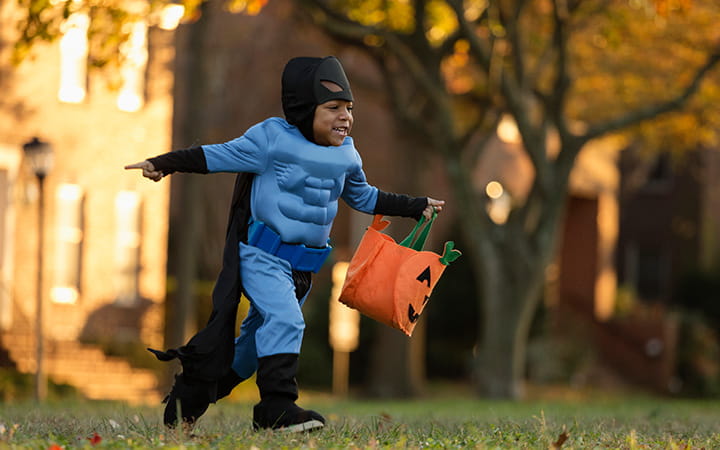A More Traditional Halloween Celebration is Possible This Year
October 20, 2021
 University Hospitals Rainbow Babies & Children'sExperts in Children's Health
University Hospitals Rainbow Babies & Children'sExperts in Children's Health

It's a welcome sign in the coronavirus pandemic that health officials have relaxed guidance for celebrating Halloween this year.
Several developments have led experts, including Amy Edwards, MD, pediatric infectious disease specialist at UH Rainbow, to advise that most parents and kids can go trick-or-treating without worrying about face masks and social distancing.
Last year, traditional celebrations were discouraged and people were advised to put out bowls of candy to avoid contact. Dr. Edwards says that isn’t necessary for most people this year. Here’s why:
- The surge of cases caused by the Delta variant has eased -- cases, hospitalizations and deaths are declining.
- We have a vaccine this year. Most adults and many younger people are vaccinated.
- We understand the virus better, and know now that it does not spread on surfaces like candy bowls and wrappers.
A Different Place
“This year, we’re in a different place,” Dr. Edwards says. “We’re in an okay spot. If the focus is on outdoor activity and you keep the interactions brief, it will make for a very good and safe Halloween. For outdoor trick-or-treating, I don’t see the need to mask this year for the general healthy pediatric population.”
Some precautions are still warranted, she says. You should avoid indoor Halloween parties, especially if you're unvaccinated. Also, people who have compromised immunities should consider wearing masks when handing out candy.
“An individual parent might make a different decision. If a child has a high-risk medical condition, you might decide to have them wear a mask going door to door,” Dr. Edwards says.
Vaccines appear to be around the corner for kids as young as age 5. The Food and Drug Administration is expected to authorize emergency use of the Pfizer-BioNTech vaccine for children 5 to 11. Children 12 and older are already eligible for the vaccine.
“Hopefully, in time for Thanksgiving, kids will be able to get their first doses,” Dr. Edwards says.
Related Links
Vaccinating children against COVID-19 helps provide immunity for youngsters, while helping to stem the spread of the virus and curb mutations that lead to new, more severe virus variants. Find out about the authorized vaccines, how they work, possible side effects and the benefits of having your children vaccinated.


